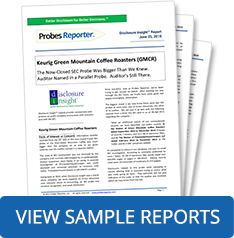Last September The Economist ran a cover story titled, "How America is criminalising the company: The world's biggest shakedown?". In response Probes Reporter's CEO, John P. Gavin, CFA, wrote a letter to the Editor lamenting the problems we routinely encounter through the SEC's failure to release documents we believe should be released to the public under the Freedom of Information Act.
We are pleased to let you know that The Economist published his letter this week.
To better understand what's at issue, we'd like to draw your attention to a kind of government document called a "Case Closing Recommendation" which the SEC consistently refuses to release. Our legal counsel is firm in the belief the SEC is violating the FOIA and its mission of market transparency by not releasing this report.
If the SEC would release its Case Closing Recommendations, which show what the SEC did in the course of a closed investigation, investors would FINALLY learn why an investigation was opened, what took place, and what conclusions were reached.
We already know many public companies never disclose their SEC probes. We also know those that do disclose too-often give investors only the scantest of detail.
Making Case Closing Recommendations public would dramatically level the playing field for investors. At Probes Reporter we invite you to join us in putting pressure on the SEC to release them. It's time.
Here is a link to Mr. Gavin's letter as published in the Economist this week (it's the second letter down on the page). We thought you’d like to see it.
SIR – We can get a police report the day after Justin Bieber is arrested, but the Securities and Exchange Commission consistently denies the public access to reports that summarise what took place in its closed investigations. Since 2000 we have filed thousands of Freedom of Information Act (FOIA) requests with the SEC seeking investigative records on public companies.
At any given time we typically know of about 100 public companies involved in continuing undisclosed SEC probes. We are always denied access to the one report the SEC has prepared that summarises why the investigation was opened, the work performed and the conclusions reached. Those reports that are disclosed provide the scantiest of detail.
If the SEC simply complied with the FOIA, transparency would be improved. Investors in capital markets would benefit as regulators and the regulated would be held more accountable. This includes those overseeing the funds to bail out Mr Bieber.
John Gavin
Chief executive
Probes Reporter
Plymouth, Minnesota

![[title]](https://i1.ytimg.com/vi/f-hMBleq3gg/mqdefault.jpg)
